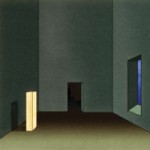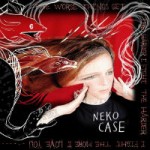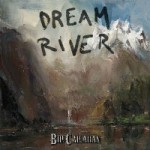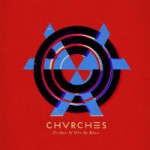Music Reviews, 10/2013
This issue
Oneohtrix Point Never, R Plus Seven
Neko Case, The Worse Things Get, the Harder I Fight…
Body/Head, Coming Apart
Bill Callahan, Dream River
CHVRCHES, The Bones of What You Believe
Tim Hecker, Virgins
HAIM, Days Are Gone
Oneohtrix Point Never | R Plus Seven
Warp Records
by James Brubaker
R Plus Seven, the latest from Daniel Lopatin’s Oneohtrix Point Never, begins and ends with an organ. Album opener “Boring Angel” starts with a sustained organ drone, over which Lopatin slowly layers quiet percussion, a lazer-like synth arpeggio, and a jittery, rhythmic keyboard line. As Lopatin’s compositions are want to do, the whole mess converges into a smooth wash of organ and synthesizer, which abruptly cuts off only to be replaced by a brief, breathtaking stinger of choral voicings played through a sampler and a bigger-than-church-on-Sunday organ fanfare. While the initial presence of the organ in the song’s opening build isn’t particularly noteworthy, this closing organ statement is wildly surprising—nowhere, across any of Lopatin’s work as Oneohtrix Point Never, outside of the uncanny, lo-fi folk of the uncharacteristic “I Know It’s Taking Pictures From Another Plane,” and the slow-burn piano on “Replica,” has Lopatin ever embraced a sound so warm and organic. When the organ makes its triumphant, breathtaking return in the final moments of album closer “Chrome Country,” this time accompanied by tinny and restless keyboard lines and hints of a synthesized choir, it has already become clear that R Plus Seven is a very different project from Lopatin’s previous work—while Lopatin has always found ways to open up vast wells of emotion through his synth and sample based compositions, this time he has managed to make something utterly and unexpectedly—I don’t know, soulful?
And maybe soulful isn’t quite the right word, but regardless, my use of the word here is in no way meant to imply that Lopatin’s previous work was soulless, only that, until now, Lopatin’s work as Oneohtrix Point Never has found its soul by concerning itself with, well, the absence of soul. In the long, elegant drones that characterize most of Oneohtrix Point Never’s early work, Lopatin made music to soundtrack alienation and dread—consider the icy, nervous keyboard arpeggios of “Computer Vision,” from 2009’s Zones Without People, or the desolate wall of synths that make up “Laser to Laser” from 2007’s Betrayed in the Octagon. These compositions were slow and at times almost formless, harkening back to New Age’s futurism but with a minor key twist that effectively invented a new music with which to describe the alienation and desolation that the average pop song can rarely make sound like anything more than bullshit self-absorption—this was music from EPCOT center circa 1982, but if all of Disney’s imagineers went off their meds at once; this was music that might have made an effective alternate soundtrack to Logan’s Run, or Altman’s so-bleak-you-can’t-even-tell-what’s-happening Quintet.
After a slow evolution away from that desolate new music, R Plus Seven finds Lopatin largely abandoning those vast reserves of sorrow in favor of something altogether livelier, more humane, and, perhaps, most surprisingly, more hopeful. In a way, Lopatin’s newfound soulfulness on R Plus Seven makes sense in the context of Oneohtrix’s recent procession—2010’s Returnal didn’t sound all that different from Lopatin’s earliest work, but added some abrasive white noise and a bit of rhythm, while 2011’s Replica relied more heavily on samples, structure, and melody to produce glitchy rhythms that run through most of that album’s songs. The reason R Plus Seven is so surprising, then, despite the fact that, in terms of craft it merely takes another step toward rhythm and structure, is that the album’s emotional tenor is so wildly different from its predecessors. Even on Replica’s livelier numbers—the dizzying sound collage of “Sleep Dealer,” and the aggressively fragmentary “Child Soldier,” for instance—Lopatin’s compositions were still shot-through with sadness, anxiety, and dread. Compare this to a song like “Americans,” from R Plus Seven, which applies many of the same techniques as its counterparts on Replica, but as each of this new song’s brief movements plow through weird and unsettling samples and textures, its tone grows richer and warmer, even going so far as to end with an ecstatic segment of swirling samples and staccato keys that gives the impression that they might be soundtracking the busy days of so many robotic captains of industry spinning deals, making money, investing today in progress and the new futures of tomorrow (you should probably read that last part in your best approximation of a booming, 1930’s news reel voice).
A similar sense of futuristic optimism is evident in album highlight “Zebra.” The song opens with jittery, hopeful keyboards before eventually resolving into a wistful outro, complete with a subtle saxophone sample. If Lopatin’s earlier compositions were soundtracks to grim dystopian films, “Zebra” wouldn’t seem out of place playing over the montage of progress leading into the final act of H. G. Wells’ Things to Come. Elsewhere, “Problem Areas,” blends vibrant synths with sampled choral vocals, another brief appearance from the organ, and a sample of a child’s voice, which makes the song sound downright inquisitive, as if it were written for a Sesame Street segment showing how circuit boards are made. “Still Life” goes a bit dark, with a dramatic wall of synths powering the song towards its lovely conclusion, built around sampled choir voicings, that effectively resolves the anxious tension that comes before.
At the outset of this review, I suggested that R Plus Seven is an unexpectedly soulful album. I don’t want to seem as if I’m conflating optimism with soulfulness. The album’s optimism is certainly part of the that soulfulness, but the album’s soul is produced more from its tensions—the rhythmic movements sputtering into drones, then stuttering through sampled voices and false starts that give way to a snippet of a non-synthesized violin (as on “Inside World”). It is the blending of the uptempo, rhythmic use of keyboards with drones, glitches, sampled voices, and occasional snatches of acoustic instruments that make R Plus Seven Lopatin’s most vibrant album—these songs live and breathe with the same brand of audacious chaos and optimism as Gershwin’s “Rhapsody in Blue,” or, fuck it, I’m going there, Copland’s “Appalachian Spring.” Sure, Lopatin’s songs never achieve—nor reach for—the grandiose melodic sweep of those famous compositions, but structurally and, at times tonally, Lopatin’s music isn’t that far removed from those compositions’ wilder, more excitable moments.
So there—R Plus Seven is an album full of soul, and if that soul hinges on the tension between the electronic and the organic, between that which is unknowable and technology’s insatiable desire to shape that unknown into a better tomorrow, then maybe what we’re talking about is a new posthuman soulfulness, the only soul we can truly know anymore as technology becomes increasingly entangled with our selves—and I say that without even a hint of regret or nostalgia for a time before technology (who do you think I am, Win Butler? Sheesh) became part of our lives. And if my hunch is right, R Plus Seven doesn’t lament this creeping posthumanism either, choosing instead to celebrate the give and take between humans and machines. If Oneohtrix Point Never’s early compositions were a new way to describe sorrow and alienation, then with R Plus Seven, Lopatin has invented the new posthuman spiritual, wordless future-hymns that, if they’re going to soundtrack anything, might as well soundtrack V’yger’s communion with Decker at the end of Star Trek: The Motion Picture. Simply put, R Plus Seven is some next level shit, a knowing spiritual soundtrack for our ever accelerating posthuman evolution.
Neko Case | The Worse Things Get, The Harder I fight…
ANTI
by Joshua Cross
Let’s get one thing straight. Neko Case is punk as fuck.
Case has long been miscast as an alt-country siren, a label she is quick to reject. Sure, Case’s first several albums, with or without Her Boyfriends, had noticeable country influences. But unless you stopped paying attention circa Furnace Room Lullaby, you should know that influence has waned with every successive album.
But what has never waned is Case’s hardscrabble, tough as thunder attitude. What defines punk has never been the frantic three power-chord chop or the crash-crash-crash-crash of snare in four-four time or the blue Mohawks and sleeve tattoos, but the attitude, something so many bands in the 90s and early aughts failed to grasp. Punk has always been the attitude of thumbing one’s nose at established order. Neko Case has always embodied that punk attitude, which should come as no surprise when we consider she cut her teeth as a drummer in the Vancouver punk scene of the 90s, or the fact that, like Johnny Cash, she is one of the few musicians banned for life from the Grand Ole Opry.
The personas Case adopts in her songwriting have often embodied this punk spirit, and nowhere is that more apparent than on her latest LP, The Worse Things Get, the Harder I Fight, the Harder I Fight, the More I Love You. “If I puked up some sonnets,” she ponders on “Night Still Comes,” “Would you call me a miracle? I’m gonna go where my urge leads.” This bravado, this unwillingness to play the role of the sweet girl with a pretty guitar, runs throughout Case’s songwriting.
Case has long challenged conventional gender roles, refusing to live by the expectations society uses to restrict women, a trait no more apparent than in her constant questioning of gender roles, both male and female. This tendency finds voice on the album’s first single, “Man,” in which Case sings, “I’m a man / That’s what you raised me to be. / This is not an identity crisis. / This was planned.” Looking deeper into the song, we find that Case speaks here as a man to challenge the very idea of what it means to be a man in American today, calling into question the notion of male privilege and rape culture. “And if I’m dipshit drunk on pink perfume,” the speaker declares, “I’m the man in the fucking moon / Cause you didn’t know what a man was / Until I showed you.” By exposing gender imbalances, Case demonstrates what it means to be a man. And what could be more punk that challenging gender norms and male privilege in today’s political climate?
Musically, The Worse Things Get harkens back to Fox Confessor Brings the Flood, arguably her best record ever (though Blacklisted holds that special place in my heart), in its sensibilities and drive, though Case’s vocal melodies bear striking resemblance to Middle Cyclone. As a whole, this record is much tighter and more focused than the sprawl of her last release. Of her entire catalogue, The Worse Things Get is Case’s most poignantly autobiographical record to date, as she grapples with the loss of her grandmother and both parents, which affords her ample room to explore what it means to be a parent or to lose a parent figure, what it means to nurture and abuse, to ache and grieve. There is very little twang on this record, but there’s plenty of snarl, and there’s plenty of empathy for every person she sings as, for, or about.
Body/Head | Coming Apart
Matador Records
by Brian Flota
Contrary to the band’s name, there is something completely disembodied about the purposeful noises that Body/Head generate. The duo of Kim Gordon, better known for her quarter-century tenure as the bassist in Sonic Youth, and Bill Nace, her lesser known collaborator (who has a solid noise-making pedigree himself, having worked with Michael Morley of The Dead C and free drummer Chris Corsano in Vampire Belt), forsake a rhythm section or the melodic qualities provided by keyboards, instead opting for an improvisational two-guitar attack. On their first full-length effort, the appropriately named double-LP Coming Apart, one gets the impression that the more traditional forms of songwriting and performance are, in fact, coming apart. Following the relatively conventional outings by her former SY peers Lee Ranaldo (last year’s Between the Times and the Tides) and ex-hubbie Thurston Moore (this year’s Chelsea Light Moving, his new group’s self-titled debut), Coming Apart is positively alien, more closely resembling her old group’s experimental SYR series of vanity EPs than, say, “Kool Thing.” On Coming Apart, Gordon and Nace use their guitars like most outfits use their vocals and drums—to generate rhythm and catharsis. Their approach to the instrument gives one the impression they are relearning it, reconfiguring it, maybe even completely forgetting it. This is not music for the masses. It is challenging, cinematic, even horrific, but not like a slasher flick: rather, like a German expressionist film with a malevolent antagonist whose knotty shadow stretches across the screen.
“I can only think of you in the abstract,” sings Gordon as the album opens over an arpeggiated figure that recalls the best moments off Sonic Youth’s best album of the Jim O’Rourke era, Sonic Nurse (2004). Fittingly, as “Abstract” progresses, it becomes increasingly abstract, the guitars suffering the pangs of being transformed into percussive instruments. Vocally, Gordon’s breath-y utterances waver and rarely deviate from just a few selected notes. They contribute to the haunting quality of this music. Save for “Murderess,” which features a synthesized pulse and scant guitar work, Coming Apart rarely wanders from the path traveled on “Abstract.” For the next hour, Body/Head creates, but fortunately never imitates, something that rather resembles outsider music. There are similarities to the ESP-Disk band the Godz or the early albums of Jandek. Listeners may also draw comparisons to the more popular but no less challenging “Cambridge 1969″ by John Lennon and Yoko Ono or Nico’s collaboration with John Cale and Lou Reed, “It Was a Pleasure Then” (1967). What Sonic Youth fans will likely hear is the conclusion of EVOL‘s “Death to Our Friends” (1986) stretched out over the entirety of an album. And that is perhaps the most fitting comparison of all, as Gordon’s conviction to this highly unconventional and expressive material suggests psychological mourning as well as a subsequent rebirth: a noisy, screaming, messy rebirth.
Though the album’s first seven tracks take half an hour to get through, its last three numbers, “Aint,” “Black,” and “Frontal,” the best on the album, last 36 minutes, combined. In other words, as the album progresses, it gets even more challenging! “Black” finds Gordon singing the words to the traditional folk song “Black is the Color of My True Love’s Hair.” Body/Head’s version recalls avant-garde jazz singer Patty Waters’ infamous rendition of the number on her 1966 album Patty Waters Sings, a performance which foreshadowed the vocal stylings of Yoko Ono and Diamanda Galas. It does so in spirit, not in execution, as Gordon’s singing voice is as plaintive and asthmatic as ever. Instead, the continuous feedback and arrhythmic plink-plunking of the guitar strings paint a picture of screaming seagulls circling over a beachfront dumpster on a cloudy afternoon. Like the Waters performance, “Black” is also thirteen minutes long. The closer, “Frontal,” is even more stark and lengthy, lasting seventeen minutes. Despite its length, the staccato and feedback-soaked guitar figures generate enough rhythmic intensity so that it never loses steam. It is a fitting end to a demanding album. Gordon and Nace’s improvisational guitar interplay is positively refreshing. They prove that the guitar can still be a wonderfully expressive instrument. However, when two of them are put together and played like broken bottles, the result is pure sonic impressionism—the kind of impressionism that involves sneaking into the old academy and gutting Monet’s water lilies with shards of colored glass.
Bill Callahan | Dream River
Drag City
by James Brubaker
Bill Callahan’s Dream Riveris a subdued, weird album. In contrast to Callahan’s last effort, 2011’s big and stunning Apocalypse, Dream River feels almost as if it exists in miniature. This is not a dig. As exhilarating as Apocalypse could be—think the crashing chorus of “Drover,” the ragged, punk energy of “America,” or the jazzy swoon of “Free’s” to name but a few big moments—the album’s broadly widescreen, and wholly unorthodox approach to Americana made it easy to lose some of Callahan’s characteristically precise, perfectly rendered small moments in the shuffle. That’s not a dig either—Apocalypse was a masterful work that highlighted Callahan’s melodic chops and his songwriting ability as he wrestled with themes of rugged individualism and escaping into a romanticized vision of America’s Great Outdoors. The bigness of the album’s themes were reflected in the songs’ arrangements resulting in one of Callahan’s most ambitious and satisfying albums.
Dream River is a very different album, but is no less ambitious than, and just as satisfying as its predecessor. The primary difference between Dream River and Apocalypse is scope. Dream River, like Apocalypse,is certainly a lushly produced album, but it lacks some of the big, cinematic exteriors of the previous album. Album opener “The Sing,” a nice, frontporch country number built on quiet guitar and wistful fiddles, is about a protagonist drinking in a hotel bar, “looking out a window that isn’t there.” In the album’s first quietly heartbreaking melodic shift, this time into a brief half-speed, pseudo-waltz, Callahn tells us that his character is “looking at the carpet and the chairs.” Already the differences between Apocalylpse and Dream River are drastic: there are no cattle herders on the open planes, here, no open roads, just a sad guy in a bar, telling us that “The only words I’ve said today are beer, and thank you,” and comparing himself to Marvin Gaye: “I’ve got limitations like Marvin Gaye.”
When Callahan’s lyrics stray toward nature on Dream River, he’s usually somehow rejecting its romanticism, or undercutting its beauty. In “Spring,” Callahan sings, “The mountains don’t need my accolades,” not because they’re grand enough on their own, but because they are “tired of praise.” Callahn continues, informing us that “spring looks bad lately anyway, like death warmed over.” On “Summer Painter,” Callahan sings warnings of “bad luck at sea,” and the difficulties of finding autumn work in a summer town. And on “Seagull,” Callahan tells us that “A Barroom may entice a seagull like me,” and after singing of melting into the river of dreams, the song’s character wonders if he will ever wake up. Such a move from the great outdoors to dimly lit bars or, as in “Seagull,” to the private spaces created while we sleep, runs the risk of navel gazing, but we all know Callahan’s work better than to think that could possibly be a problem, here. With every uttered word Callahan focuses on the universal fears and anxieties that inhabit his quiet, haunted songs.
And haunted these songs most surely are. On one of the album’s most nature-oriented songs, “Ride My Arrow,” behind lyrical juxtapositions of shooting eagles with arrows, eating pilgrim guts, and navigating the wild, tangled, outdoors, Callahan builds an eerie, weird soundscape out of skittery rhythm guitar, electric piano, and gently bluesy guitar licks. When Callahan sings, “Because life ain’t confidential/No, no, no” it sounds as if he’s whispering the world’s darkest, scariest secret. Conversely, on “Small Plane,” a quiet, little lullaby, Callahan’s lyrics are haunted by a once unnamable absence, now appeased with a fierce, true love. While the song uses flying an airplane as a metaphor for a relationship, it is the small moments, less tied to the metaphor, that resonate: “Sometimes you sleep while I take us home/That’s when I know we really have a home.” Here, the specter of living alone and without a sense of home subtly hangs over the song, and all that’s left for Callahan to say is, “I really am a lucky man.”
I suspect with time, repeat listens, and access to a lyric sheet, some of my reading of Dream River will fall apart. Apocalypse wasn’t just an album about escape into a widescreen vision of America’s Great Outdoors, and I’m doing that album a bit of a disservice by speaking only to its broader strokes, just as I’m sure that my attempt to reduce Dream River to its fascination with interiors is doing the same kind of disservice. Callahan’s albums are more complex and nuanced than such easy themes allow for. That said, when we reach “Winter Road,” the weary, tired, and completely gorgeous closing track on Dream River, and hear Callahan singing about driving home on a dangerous, icy road (“The road is dangerous/And pretty and white . . . And I’m heading home,”) it’s difficult to deny that, if Apocalypse was Callahan’s album about rugged individuals escaping into the American wild, then Dream River is about coming back home and sharing a life. When Callahan sings, “Time itself means nothing/but time spent with you…” trailing off to imply that the shared time means something—a something that we hear echoed in the song’s weepy fiddle—it’s hard not to hear a celebration of love and community in the embrace of beauty. Callahan makes this almost explicit with the album’s last line: “When things are beautiful, just keep on.” But as with all things Callahan, the song isn’t quite that easy, and in the turn of a minor key guitar lick, and that sad, pretty violin part, we’re left wondering how long, exactly, the song’s speaker will be able to “just keep on.”
CHVRCHES | The Bones of What You Believe
Glassnote
by Joshua Cross
It’s been years since I last watched High Fidelity, long enough that I forget most of the witty record store banter between John Cusack and Jack Black, or most of the obsessive “Top 5” list making. But for whatever reason, one such scene has always stuck with me: The discussion of the top five opening tracks of all time. This is a list I’ve made in my mind many times over. “Smells Like Teen Spirit” goes in there, no questions asked, but the other four tracks tend to shuffle.
Were I to rank my top five opening tracks today, “The Mother We Share” by CHVRCHES would be in contention. I have always found it especially bold for a band to begin an album with the strongest track, likely because this establishes a challenge. Here’s the best of what we’ve got, now we’re going to try to top that with the next eleven tracks, or at the very least not let that momentum crash.
And “The Mother We Share” is the strongest track on The Bones of What You Believe. It represents everything great about one of the most exciting new bands of the day: It’s frenetic, dancy, catchy, and it will rip your throat out if you’re not mindful. Every time I listen to “The Mother We Share”—and it’s been more than a year since I first heard the single—I’m surprised, caught off guard by something unexpected and fresh. I find myself dancing no matter where I am. If I’m not careful, I find myself on the verge of tears, and I cannot explain why.
“The Mother We Share” has to be in the conversation for track of the year, so to start a record, let alone a debut, with such a bold declaration sets a high standard for the rest of The Bones of What You Believe. The album consistently lives up to this challenge, track by track, blow by blow. From the aggression of “Gun” to the pleading of “Recover” (which should be in the running for a top five list of best verge-of-breakup songs ever) to the jubilation of “Night Sky,” almost every track leaves the listener on the edge of her seat, wondering if she should join in or just watch the dance from afar. (She should join in.)
The production and execution draw apt comparisons to M83 in terms of recent electronic dancepop. But I think the best comparison I can draw is with fellow UK band New Order, whose influence can be felt clearly, especially in moments like the grand swell in “Tether” or the opening riff of “Science/Visions.” Like New Order, and in particular before they were playing arenas and World Cups, CHVRCHES are an electronic band, and they want to make you dance, but not at the expense of songwriting, which remains their strongest gift.
Another comparison to New Order that strikes me is Lauren Mayberry’s voice. Like Bernard Sumner, Mayberry does not have the strongest voice or the largest range, but her vocals are razor sharp and precise, and they fit the music exactly. Mayberry’s wispy voice creates a striking contrast to the threatening persona of the lyrics to “Gun,” in which she sings, “You had better run from me / With everything you own / Because I am gonna come for you / With all that I have / I am gonna break you down.” A voice so soft and light singing words so menacing at first seems almost comical, but the contrast between message and delivery makes these promises all the more threatening.
In an era in which every wannabe pop diva is autotuning every single flaw out of her delivery and forcing herself into a posthumanist version of perfect pitch, there is something truly refreshing in the wispiness of Mayberry’s voice. This is not to say that CHVRCHES avoids adding effects to their vocals—far from it. But the effects are just that, effects, and not the vehicle for the voice. Mayberry’s voice stands apart, its contrasting timidity and bravado on equal footing, and the way she compliments the music perfectly makes this one of the most exciting debut albums I’ve heard in years.
Tim Hecker | Virgins
Kranky
by Brian Flota
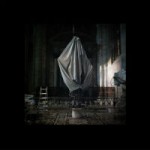 Tim Hecker has released another winner with Virgins, the follow-up to his critically acclaimed 2011 effort Ravedeath, 1972. His industrial-grade brand of ambient music continues to be equal parts beautiful and ugly.
Tim Hecker has released another winner with Virgins, the follow-up to his critically acclaimed 2011 effort Ravedeath, 1972. His industrial-grade brand of ambient music continues to be equal parts beautiful and ugly.
For more than a decade, Hecker has been generating his abrasive brand of ambient music which owes as much to Nine Inch Nails as it does to drone doom acts like Earth and Nadja (who Hecker has collaborated with). In fact, at times on Virgins, Hecker’s music sounds like a percussionless version of what I WISHED Nine Inch Nails sounded like. Hecker’s music turns keyboard music inside out. Pianos and what sounds like toy pianos or maybe even harpsichords or treated pianos are carefully overdubbed, resulting in a percussive sensibility not too dissimilar from a marionette show attended by an audience of murderous circus clowns. Added swooshing effects transform this music into either a Gothic Dance Party or soundtrack music that would make Mike Oldfield—the man who composed the theme to The Exorcist—feel like a total fraud. It is too eerie to be relaxing, but too beautiful to be truly frightening.
What makes the music on Virgins work is that it approaches its craft more like Aphex Twin than Eno. While Eno’s pathbreaking ambient recordings continue to influence musicians who wander in this mysterious terrain, some of his own ambient experiments produced recordings that could, at times, be suitably played in a day spa, where the patrons drape the tied sleeves of their cashmere sweaters over salmon-colored Oxford shirts, eat hundred dollar hors d’oeuvres, drink perfectly-aged white wines, and get latte enemas. Hecker’s creepy sonic concoctions would make these people spontaneously combust. And while his off-kilter sensibilities owe plenty to Aphex Twin, they lack his dark sense of humor. The result is that the music never draws too much attention to itself as music, which is ultimately the goal of ambient. However, if one decides to listen carefully, they will be rewarded…with macabre nightmares!
HAIM | Days Are Gone
Columbia
by Joshua Cross
 I first heard Haim (rhymes with “time”) nearly a year ago when their debut single, “Forever,” began earning sporadic satellite radio airplay. That one listen and I was hooked on this band of sisters from southern California. Their blend of 70s rock meets 90s R&B meets contemporary hip-hop sounded more infectious than anything usually spun on the radio. Since then, I have downloaded everything Haim have released, a series of singles and EPs leading up to the launch of Days Are Gone, and I have loved every song I have heard, though none of them ever lived up to that initial listen to “Forever.” Haim have gained so much momentum over the past year, I found myself anticipating this debut album more than any record in years, which built up borderline unrealistic expectations.
I first heard Haim (rhymes with “time”) nearly a year ago when their debut single, “Forever,” began earning sporadic satellite radio airplay. That one listen and I was hooked on this band of sisters from southern California. Their blend of 70s rock meets 90s R&B meets contemporary hip-hop sounded more infectious than anything usually spun on the radio. Since then, I have downloaded everything Haim have released, a series of singles and EPs leading up to the launch of Days Are Gone, and I have loved every song I have heard, though none of them ever lived up to that initial listen to “Forever.” Haim have gained so much momentum over the past year, I found myself anticipating this debut album more than any record in years, which built up borderline unrealistic expectations.
That leaves me with a small dilemma with Days Are Gone. More than half of the eleven tracks on the album—“Falling,” “Forever,” “The Wire,” “Honey & I,” “Don’t Save Me,” “Go Slow,” and “Let Me Go”—feature on the series of singles and EPs leading up to the album’s release. These songs have become so familiar that much of the thrill of a new album is missing. I got so used to these songs in a different context or as stand-alone tracks that they sound out of place on the LP, the way long-loved favorites sound almost unfamiliar in the repackaging of a singles collection or a best-of compilation. This does not take away from the strength of the individual songs, but somehow lessens the album as a whole, or at least the way I have learned to read albums as complete thoughts.
One consequence of the familiarity of many of these songs is the additional pressure it places on the non-singles, the filler songs, to generate the excitement that usually accompanies a new album. Fortunately, most of the previously unreleased songs successfully rise to the occasion. “If I Could Change Your Mind” and “Days Are Gone” show off even more of the 90s R&B influence than the singles. “My Song 5” is the most overtly hip-hop track on the album. These songs, while perhaps not as buoyant as the singles, accentuate the elements that define the Haim sound and show just how contemporary they are in their songwriting and musical style.
Because Days Are Gone collects so many previously released songs, the album feels like a throwback to the LPs of the 1960s—think the Beatles’ early U.S. releases—which collected and repackaged the singles and b-sides that many fans had already purchased. At the same time, this phenomenon is as contemporary as could be in the age of iTunes, Spotify, and Internet radio, with the user’s ability to pick and choose tracks rather than the larger units of a full album. In a way, Haim move us closer to our rock & roll roots, though their sound is such a fantastic blend of disparate eras and musical styles that they are nothing if not contemporary, defining our musical future by examining the past through the lens of the present in a fresh pastiche that would give Tarantino a boner.

